- Home
- Peter F. Hamilton
Best of British Science Fiction 2016 Page 15
Best of British Science Fiction 2016 Read online
Page 15
“If she is you, will she react to finding the monster the same way you would?”
She sucked air through the gap in her front teeth. “I guess.”
“And how would you react, if, when you looked under the bed, you found a monster there? What would you do?”
“I...”
I waited. The silence stretched between us. This was somewhere she hadn’t been before. “I don’t know,” she said quietly.
“But you’d do something? You wouldn’t just sit there?”
“No,” she agreed. “I’d run... hide. Scream, maybe.”
“I’m sure you would. And what would your parents do, if they heard you scream?”
“They’d come running,” she said, and they would. Any parent would.
I let her think about this for a moment. “Ana, you’re intelligent, resourceful, and brave. And the other Ana, she is exactly the same. She is, after all, you. She – you – would not take it lying down. You’d fight, you’d run. Your parents would help. The one thing you would never be, is a victim. Don’t think I haven’t noticed the hobby horse propped up against the toy chest, ready for action.”
“And the roller skates on the landing,” she said.
I wasn’t sure how the roller skates would help. Perhaps she hoped the monster would trip on them. She’d be upset if I told her that her mother wordlessly tidied them up each night. “And the skates,” I diplomatically agreed. “It’s not much, perhaps, but you’re doing the best you can. And so would the other Ana. No monster is going to get a free lunch in this house.”
She laughed, a lovely little laugh, made all the more charming by its rarity of use.
I pushed on. “So it’s not a foregone conclusion that the monster always wins. And if it does not–”
“Then there are two Anas!” she interrupted.
This wasn’t quite where I’d been going. I wanted her to acknowledge that she wasn’t responsible for what happened in the other Universes. How could she be? But sometimes, usually in fact, you had to let your patient find their own path.
“And then four, and then eight, and then...” she babbled on.
A small chime rang out on my wristwatch. “Okay Ana. I think we’ve made good progress. We’ll leave it there for today.”
A muffled voice came through the door. “Ana? Honey? Who are you talking to in there?”
Ana called back, “No one, mummy.”
Which was an illuminating denial. I jotted it down for future discussion, curious to see if Ana’s mother would come into the bedroom. “Okay sweetie,” she caved in, as I suspected she would. “But go to sleep now, you hear?”
Ana waited until the footsteps faded away down the hall. “Goodnight, Doctor.”
“Goodnight, Ana,” I replied, “sleep tight.”
And then I slid myself back under her bed, listening to her breathing softly slow and waiting for tomorrow night, when she would once again lift the covers, and – all being well – discover me lying there, ready for our next session.
Liberty Bird
Jaine Fenn
This is the moment. That first glimpse of space, coyly revealed by the widening doors. Kheo gives his instruments the attention they require, but his eye is drawn downwards, to the banded glory of Yssim, the cold and distant light of the stars beyond.
His exit is faultless. The Clan insisted he pre-program it, rather than take even the miniscule risk of their favoured son screwing up and dinging his yacht on the hangar doors. That would never do, not with the whole world watching.
Some impulse had made Kheo visit the engineering hangar three days before the race. He should either have been preparing himself mentally with relaxation and centring exercises – as his family would prefer – or drinking, gambling and womanising in the lowtown rings – as the media would expect – but he had a sudden desire to be alone with his yacht, without the tech crew fussing around.
The hangar was the largest open space on the liner and the ship’s spin provided near-normal gravity here. After two months away from Homeworld, the echoey open space and illusion of full weight were disconcerting. In the low lighting Liberty Bird was a point of colour, although her red and blue hull was muted by the oily shadows.
Kheo reached up, tracing the fusion yacht’s perfect lines, his hand passing just below the Clan crest emblazoned on her side. Someone had left the steps in place; it was only logical he use them to climb into the cockpit. He sighed as he sealed the canopy. Liberty Bird was the only birthright he wanted. Yet the race she had been built for might not be held many more times and if his family had their way this would the last time he would be permitted to compete. That made claiming his third win even more important.
He started at movement glimpsed out the corner of his eye. Someone out there, down on the hangar floor. A thief? A saboteur from a rival clan who had somehow got onto the Reuthani liner? His heart raced. The net was buzzing with stupid gossip: with no one to keep them in check any more, ancient clan rivalries were getting out of hand.
No, just Chief Mechanic Sovat. Kheo liked Sovat, respected him. Yes, that was what he felt: respect. Sovat often worked late, went above and beyond.
Except Sovat didn’t appear to be working. More like waiting. Another of the tech team walked in, a younger man whose name only came to Kheo after a moment’s thought. Greal: junior propulsion specialist, university educated, rather effete for the rough-diamond world of the yacht-techs. Why were this mismatched pair meeting here so late? Not for something nefarious, he hoped. They appeared to just be talking, standing close.
Oh. Had he really seen –? Did they really just –?
Sovat stepped back, then looked around. Kheo shrank down in the seat, holding his breath. The Chief Mechanic’s gaze passed over him, and he turned back to his companion. More brief words, then the two men left, Greal following close to Sovat. Kheo had no doubt they were headed somewhere more private.
Kheo clears the great wheel of the hangar-deck at a pace the watching cameras will no doubt find pedestrian. Of course, speed is relative: the liner is in a high, fast orbit around the gas giant far below. The first thrust of acceleration as he brings the main engines online is deceptive; he actually needs to lose orbital velocity before the start of the race.
He rotates Liberty Bird and peels away from the Reuthani Clan liner; the huge blunt needle is strung with spoked rings, their sizes and positions determining their place in this microcosm of clan life: engineering, living suites, gardens, entertainments and accommodation for the few thousand citizens permitted to accompany their betters off-world for this annual jamboree. In a touching if tacky gesture, a block of portholes in the central midtown ring have been selectively lit to spell out the words Good Luck Kheo.
All around Yssim, other Pilots are leaving their liners. Most clans, including his own, only field one Pilot these days. Some clans no longer participate in the Flamestar Challenge. Other clans no longer exist.
The yachts head for the Royal Barge, a smaller vessel in a lower orbit around the gas giant. Though the Barge now lacks any royalty, tradition still dictates that the race starts from there. It will take several hours to reach the Barge, and the formal start of the race. The approach is critical to a good start. In his five previous races, Kheo has tuned his coms into the razzmatazz that surrounds the biggest event in high society’s calendar. All across the system, pundits are discussing the latest form reports released by the clans for their teams and mulling over the detailed ion-stream data. Every other year, Kheo has revelled in the sense of being at the heart of it all yet free, out in the vastness of space.
Not this time. He selects some roots-rock – not his usual sort of music, but it should blast his head clear – and stares out into the beauty of the void, urging his mind to remain blank.
Kheo was expected to show his face at the hangar the next day, both as a courtesy to the techs working on his behalf and to attend a briefing on the current configuration of the ion-streams. He had been looki
ng forward to the tactical discussion of routes and fuel management, to sharing the respectful camaraderie of the men. Instead he was uneasy, almost nervous. He made himself chat to the usual people; act normal.
And everything was normal. In the daytime bustle, Kheo wondered if he had been mistaken; perhaps he even dreamt the encounter he had witnessed the previous evening. He spent enough time imagining such things.
Sovat was as brusquely efficient as ever when he took Kheo over the latest engine test results. There was no sign of Greal.
Sovat was the last to leave the briefing room, and he paused, as though waiting for Kheo to say something. When Kheo failed to speak, the Mechanic turned to follow his fellow techs out.
Kheo took a different route back to the suite-decks, choosing rarely used corridors and secondary float-tubes, doing his best to avoid the crew, minor family and hangers-on with their ready smiles. He spent the journey trying to work out whether the look Mechanic Sovat had given him had been an invitation.
By the time he has the Royal Barge on visual, Yssim itself is too large for his mind to interpret as spherical. The gas giant is a sky-spanning backdrop of mauve and azure, lavender and turquoise. He is close enough to spot details in the roiling turbulence between the coloured bands. Thanks to the false-colour projections enhancing his view through the canopy, he can see the ion-streams: ethereal threads and skeins, twisting and curling out from the massive world, curved lines of force linking it to Estin, the pus-yellow moon constantly pummelled by Yssim’s tidal forces.
Now comes the first test. The intricacies of orbital mechanics make an actual start line impossible. Instead Kheo, and every other Pilot, must interpret detailed positional readings then use them to apply delta-V, at the same time keeping track of the movements of the other yachts.
The exact moment the race starts is determined by the AI-enhanced stewards on the Barge, who are monitoring every one of the twenty-three yachts to determine when all of them are present in the prescribed volume of space. Just being in position isn’t enough: you need to be on the right heading and, ideally, as near the front of the volume as possible.
Fifteen ships already lined up… another entering. And another.
He makes a tiny adjustment; raising his orbit slightly. He’s in a good position but he can’t afford to leave the start volume before the last yacht enters. A false start not only annoys the watching billions, it means the culprit has to start in the secondary volume, behind everyone else.
The penultimate yacht enters the volume. Kheo’s got less than five seconds before he leaves it…
The final yacht is in place.
His board lights green.
He keys the preset that maxes the drive. The gentle hand that has been pressing him into his seat becomes a grasping fist.
The Flamestar Challenge is on.
Two days before the race, Clan Reuthani held the pre-race banquet in the liner’s Great Mess, a name which had made Kheo smile when he was growing up.
Kheo’s first banquet had been seven year ago, shortly after his sixteenth birthday. Uncle Harrik had been First Pilot then, and Kheo had joined in with the drunken and enthusiastic chorus of the Reuthani Clan anthem which serenaded him to his rest. Harrik had won the Flamestar that year, a victory made more special because that had been the first staging of the race since the Empress had been ousted; their Clan yacht had even been renamed in recognition of the coup. In all, his uncle had won twice in eight races. Impressive, but not as good as three out of six.
This year, as the diners picked over the second course of the third remove – sweet jellied consommé upon which floated spun sugar confections in the shape of fusion yachts – a lull in the quiet murmur allowed an overloud stray comment to surface.
“Liberation’s become a dirty word!”
The speaker was Kheo’s father, the Honourable Earl Reuthani. At his words silence fell across high table. Several people on nearby tables glanced at the chair between Kheo and his mother. Next to him, Prinbal sighed. His younger brother currently greeted most parental comments with sighs but for once Kheo could have joined in.
“Surely you aren’t suggesting we were better off under the Empress!” That was Harrik: no else would dare speak up, but the combination of being an ex-Pilot and having fought in the Liberation gave him the right to question the Earl.
“Course not, she wasn’t even human.” His father was drunk, as usual. “What I mean is, the commoners forget that most of us rose up when they did, an’ fought beside ‘em. And now they’re angling for this ‘New Liberation’ – from us!”
At least Clan Reuthani still exists, thought Kheo grimly.
His brother was watching their father, absorbing the adult interactions even as he pretended to disdain them.
His Mother said, “But I doubt the malcontents will get far. We need some continuity. Most people realise that. What we should be worrying about is all those other systems out there.”
“Surely contact could be to our advantage,” said Kheo, thinking of the new technologies he had heard about via the recently instituted ‘beamed virtual’ connection. After centuries of imposed isolation they were finally part of the universe at large.
A cousin chirped, “Yes, who knows what outsider technology could mean for the Flamestar Challenge?”
Assuming it continued. Now that the massive extravagance of moving everyone of note out from Homeworld to run a race around the largest body in the system was no longer maintained by the Empress’s brutal taxes, the race was becoming unsustainable. Which just made it more important that he won it again this year. But as discussion returned to the upcoming race, Kheo found his taste for the festivities dulled. He was glad when he was sung to his rest.
Alone in his room, his mood darkened further. He had spent much of his adult life being secretly grateful that he had been too young to fight in the War, that his elder sister had volunteered instead, although he doubted Father would have let an older son join the fight. Now, facing a life of responsibilities he never wanted and knew he was not up to – not to mention the frustration and hypocrisy – he almost envied his dead, heroic sister.
The first stretch is a long straight burn.
Kheo’s initial gamble paid off: he has a solid starting position. But so have half a dozen others, including Umbrel Narven. She’s one of two female Pilots, vanguard of the kind of changes the Earl hates; she has a reputation for recklessness and her clan has some of the best techs, inherited from now-defunct clans. With two close seconds and a third but no win to her name, Narven’s the one to watch.
A couple of competitors are already lagging behind, possibly because their yachts aren’t as well tuned as his, or possibly because their starts didn’t give them the trajectory they wanted for their chosen path through the ion-streams. Everyone else is still a threat.
Thirty minutes in and the field is spreading out. Now the tactics start to show, as each Pilot plots the precise course they’ll be taking through the near-invisible energy maze formed by the ion-streams. Kheo has assimilated all available data on the current disposition of the streams but now, close up, he can get more detailed readings and make final adjustments. It looks good: the provisional trajectory he agreed with his team won’t need significant adjustment.
The projection of the streams overlays the view ahead, a shifting, sparkling curtain coloured every shade of the rainbow. The colours are a code imposed by his comp. He is heading for the golden-orange area, nearer Yssim than Estin. Running close to the gas giant has inherent risks, being liable to fluxes and gravitational effects that could affect his instruments and put stress on his yacht, but he has the skill to navigate it and Liberty Bird is up to the task. And the crowd will love it.
But he is not the only one risking a close skim. By the time they are fifty minutes into the race, his sensors show two other yachts lining up for similar courses. One of them is close enough that he thinks he can actually see the tiny black speck against the looming ion field
s. His instruments ID it as the Aurora Dream. Clan Narven; he might have known.
The sense of emptiness lingered. He woke with a ridiculous urge to cry, but saw it off with a cold shower, along with all the other unwanted desires and unsafe emotions.
He was nervous at the prospect of going to the workshop but, in the end, what else would he do the day before the race? His heart tripped when he saw Mechanic Sovat, and he looked away.
After the daily briefing he lingered, and was unsurprised when the Chief Mechanic did the same. Kheo searched for the right thing to say. Finally, as Sovat raised an eyebrow and turned to go, Kheo managed, ‘Do you really think Clan Narven’s directional thrust innovations pose a threat to us?’
If the mechanic had any idea that this wasn’t what Kheo wanted to say he gave no sign. “They might well, sirrah. You’d best take the lead from the start; they have the advantage in hi-gee manoeuvring. Make Narven’s yacht work hard to catch you, and stick the course. Just like I said.”
Which he had, in the meeting, only a few minutes earlier. “Right. Yes.” Kheo looked at the man’s hands, because they were safe. Except they weren’t. They were fascinating.
“You’re a good pilot, sirrah.”
Kheo tried not to be over-pleased by the praise. Before he could stop himself he looked up and said, “I believe you worked late two days ago.”
Rather than answer immediately Sovat bent forward a little, leaning on his fists; those perfect, sinewy hands. Kheo got a heady whiff of oil and sweat. “What makes you think that?” said Sovat quietly, then added, “sirrah.”
“Never mind my reasons, Mechanic,” Kheo was glad of the table, which was high enough to hide his body’s response to the encounter. “Were you in the hangar the night before last?”
“I was.” Sovat’s gaze never wavered.
Kheo found his own eyes drawn, once again, to those hands. “And were you alone?”

 A Night Without Stars
A Night Without Stars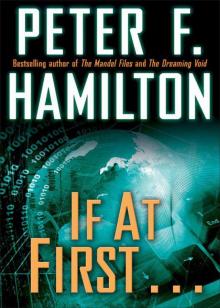 If at First . . .
If at First . . .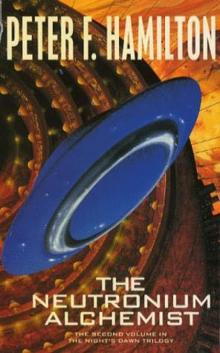 The Neutronium Alchemist
The Neutronium Alchemist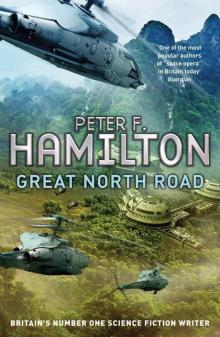 Great North Road
Great North Road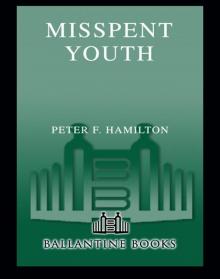 Misspent Youth
Misspent Youth Pandora's Star
Pandora's Star The Evolutionary Void
The Evolutionary Void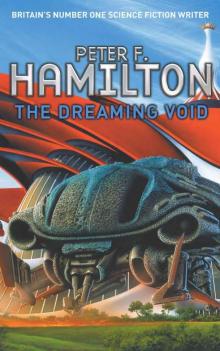 The Dreaming Void
The Dreaming Void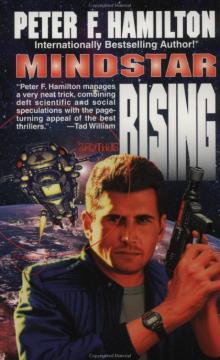 Mindstar Rising
Mindstar Rising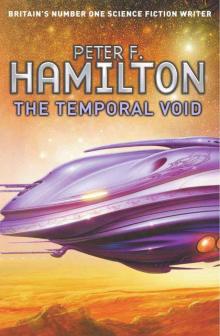 The Temporal Void
The Temporal Void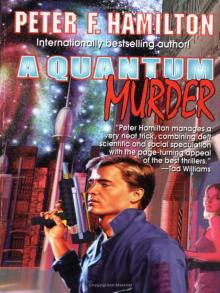 A Quantum Murder
A Quantum Murder The Hunting of the Princes
The Hunting of the Princes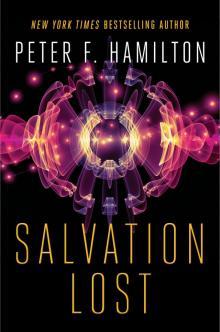 Salvation Lost
Salvation Lost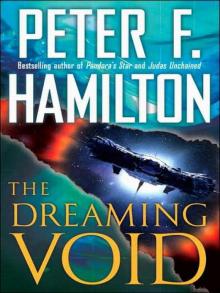 The Dreaming
The Dreaming Salvation
Salvation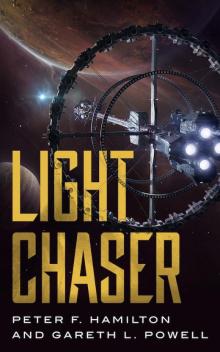 Light Chaser
Light Chaser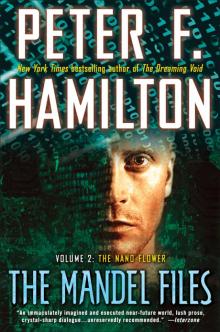 The Mandel Files, Volume 2: The Nano Flower
The Mandel Files, Volume 2: The Nano Flower![The Saints of Salvation [British Ed.] Read online](http://i1.bookreadfree.com/22/the_saints_of_salvation_british_ed__preview.jpg) The Saints of Salvation [British Ed.]
The Saints of Salvation [British Ed.]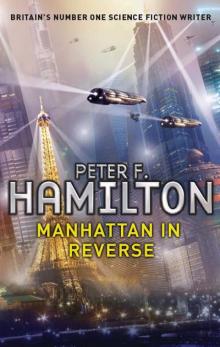 Manhattan in Reverse
Manhattan in Reverse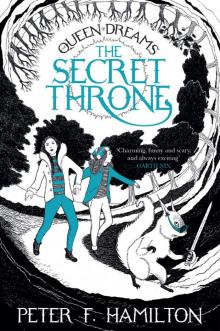 The Secret Throne
The Secret Throne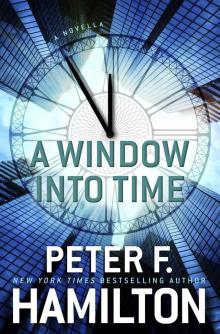 A Window Into Time
A Window Into Time A Second Chance at Eden
A Second Chance at Eden The Nano Flower
The Nano Flower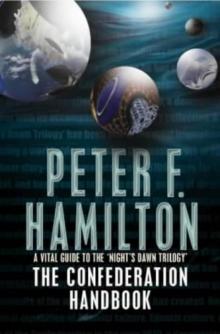 The Confederation Handbook
The Confederation Handbook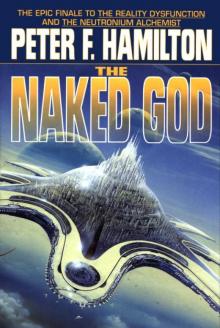 The Naked God
The Naked God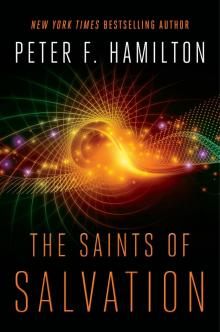 The Saints of Salvation
The Saints of Salvation The Void Trilogy 3-Book Bundle
The Void Trilogy 3-Book Bundle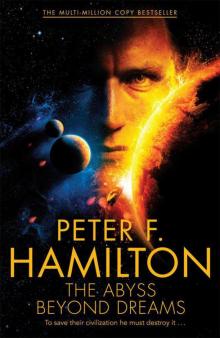 The Abyss Beyond Dreams
The Abyss Beyond Dreams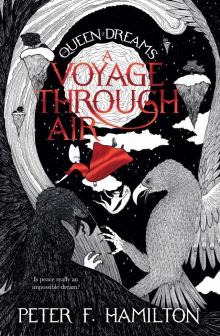 A Voyage Through Air
A Voyage Through Air Judas Unchained
Judas Unchained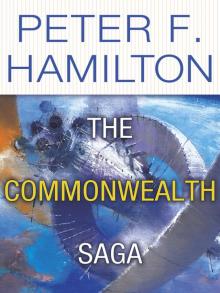 The Commonwealth Saga 2-Book Bundle
The Commonwealth Saga 2-Book Bundle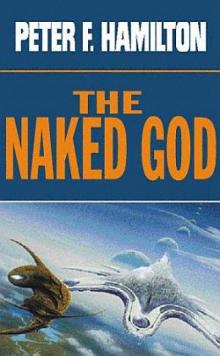 The Naked God - Flight nd-5
The Naked God - Flight nd-5 Night Without Stars (Chronicle of the Fallers Book 2)
Night Without Stars (Chronicle of the Fallers Book 2)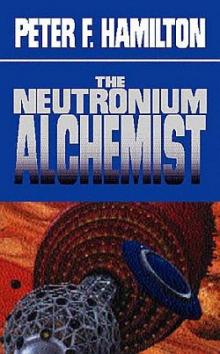 Neutronium Alchemist - Conflict nd-4
Neutronium Alchemist - Conflict nd-4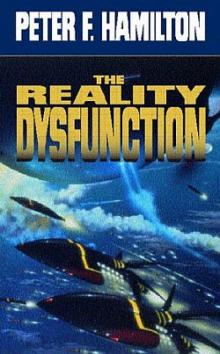 Reality Dysfunction - Expansion nd-2
Reality Dysfunction - Expansion nd-2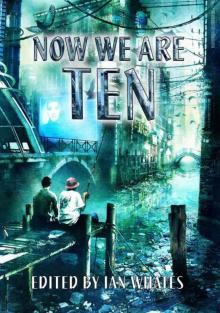 Now We Are Ten: Celebrating the First Ten Years of NewCon Press
Now We Are Ten: Celebrating the First Ten Years of NewCon Press Neutronium Alchemist - Consolidation nd-3
Neutronium Alchemist - Consolidation nd-3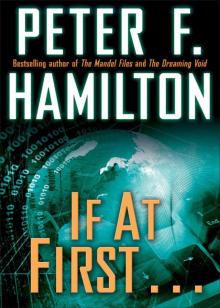 If at First . . . (Short Story)
If at First . . . (Short Story)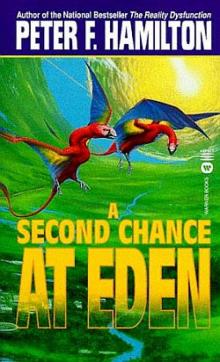 A Second Chance at Eden nd-7
A Second Chance at Eden nd-7 Judas Unchained cs-2
Judas Unchained cs-2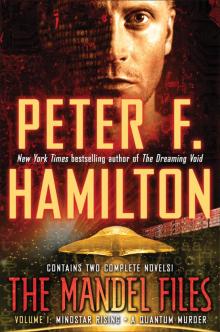 The Mandel Files, Volume 1
The Mandel Files, Volume 1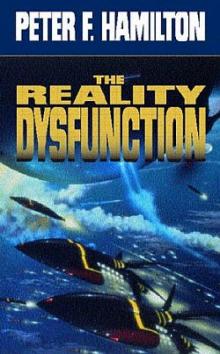 Reality Dysfunction — Emergence nd-1
Reality Dysfunction — Emergence nd-1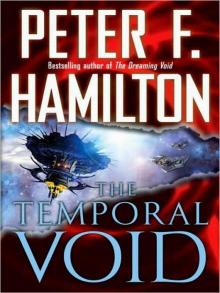 The Temporal Void (ARC)
The Temporal Void (ARC) The Mandel Files
The Mandel Files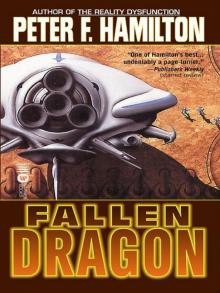 Fallen Fragon
Fallen Fragon Misspent Youth (commonwealth saga)
Misspent Youth (commonwealth saga)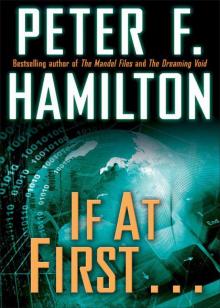 If at First...
If at First... Best of British Science Fiction 2016
Best of British Science Fiction 2016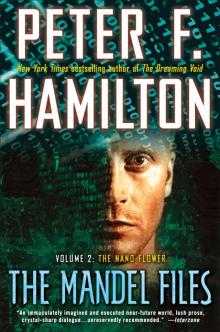 The Mandel Files, Volume 2
The Mandel Files, Volume 2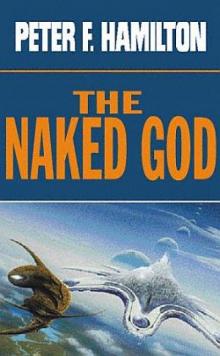 The Naked God - Faith nd-6
The Naked God - Faith nd-6 The Night's Dawn Trilogy
The Night's Dawn Trilogy Pandora's Star cs-2
Pandora's Star cs-2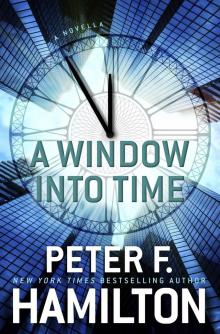 A Window into Time (Novella)
A Window into Time (Novella)